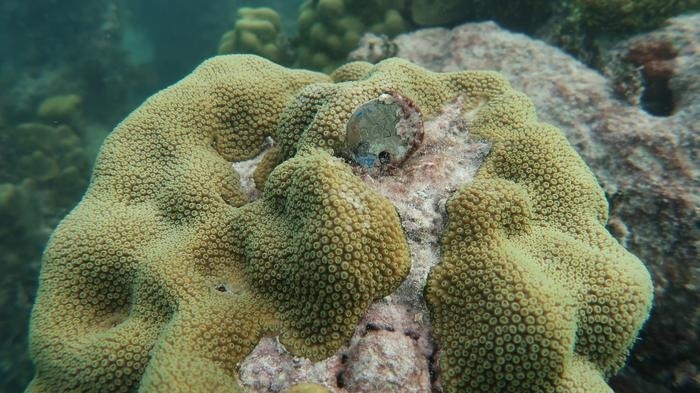The factors influencing coral resilience, which relates to its capacity to adapt and endure environmental shifts, appear to be more complex than previously thought.

Adult Orbicella faveolata coral at the near shore reef site, Cheeca Rocks, which experiences higher temperatures annually than offshore reefs. This study asked whether larval offspring of this parent population were more heat tolerant based on this history. Image Credit: Dustin Kemp, Associate Professor of Biology, University of Alabama at Birmingham
In a study published on October 18th, 2023, in the journal Global Change Biology, scientists have unveiled unexpected insights regarding a species commonly found in Caribbean waters. These findings could potentially enhance endeavors aimed at safeguarding corals from bleaching and other climate change effects.
Under the guidance of Assistant Professor of Biological Sciences, Carly Kenkel, from the USC Dornsife College of Letters, Arts and Sciences, a research team conducted a study on the mountainous star coral, Orbicella faveolata.
The aim was to investigate whether coral populations that had endured higher temperatures were capable of passing on their heat tolerance to their offspring.
However, the outcomes held a surprising revelation: Offspring from a population with lower heat tolerance displayed superior performance when exposed to elevated temperatures compared to their counterparts from a heat-tolerant population.
The findings counter the commonly held belief among scientists that if coral parents can handle the heat, so should their offspring.
Climate change poses a significant threat to the survival of coral reefs on a global scale. Increasing ocean temperatures have triggered coral bleaching, a phenomenon that renders corals weaker and more vulnerable to diseases.
The study findings have significant implications for how we think about saving coral reefs. It’s not as simple as just breeding more heat-tolerant corals.
Carly Kenkel, Assistant Professor, Biological Sciences, USC Dornsife College of Letters, Arts and Sciences
Carly Kenkel holds the Wilford and Daris Zinsmeyer Early Career Chair in Marine Studies at USC Dornsife.
To evaluate the capacity of certain corals to withstand elevated temperatures, the scientists gathered coral reproductive cells, also called gametes, from two distinct coral reef locations in the Florida Keys. One of these sites is in close proximity to the shoreline, while the other is situated further out to sea.
Subsequently, the researchers meticulously bred the corals within a controlled setting and subjected the coral larvae to heat stress conditions in the laboratory. The survival rates of the corals were recorded, and the scientists analyzed the activity of coral genes to identify any indications of stress at higher temperatures.
The surprising discovery that coral larvae from the less heat-tolerant population exhibited better survival and fewer stress indicators implies that the heat tolerance of coral offspring may be influenced by a range of factors. These factors could include whether their parents have experienced previous bleaching events or other environmental stresses.
The researchers acknowledge the need for further investigation to validate their findings. It is important to note that this study concentrates on one specific coral species, and other species might respond differently. Additionally, the research was conducted in a controlled laboratory environment, while numerous factors, aside from temperature, influence coral reefs in their natural habitat.
The researchers intend to delve further into understanding how corals adapt to environmental shifts and transmit resilience. They aim to explore the influence of corals' history, interactions with other organisms, and the general health of the reef.
Carly Kenkel, who is involved in research at USC Dornsife's Wrigley Institute for Environment and Sustainability, suggests that preserving coral reefs may necessitate a more holistic and comprehensive strategy.
Instead of focusing solely on breeding more heat-tolerant corals, we might need to consider other factors affecting coral survival and more diverse interventions.
Carly Kenkel, Assistant Professor, Biological Sciences, USC Dornsife College of Letters, Arts and Sciences
This comprehensive approach encompasses not only the genetic diversity of corals but also the external stressors that impact their overall health and vitality.
By uncovering the mechanisms behind corals' capacity to withstand escalating temperatures, scientists may uncover novel strategies to support these crucial ecosystems in adapting to a changing world.
Yingqi Zhang, the first author of the study who conducted this research during her time as a PhD student in Kenkel's USC Dornsife lab and is now at the University of Utah, views this work as a significant advancement toward the preservation of reefs.
We believe that this study opens up promising avenues for future research, which is critical to the success of reef management and restoration practices for this charismatic Caribbean coral species.
Yingqi Zhang, Study First Author, University of Utah
Journal Reference:
Zhang, Y., et al. (2023) Performance of Orbicella faveolata larval cohorts does not align with previously observed thermal tolerance of adult source populations. Global Change Biology. doi.org/10.1111/gcb.16977.